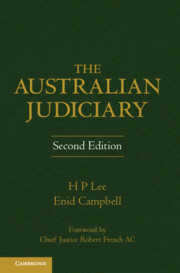Book contents
- Frontmatter
- Contents
- Preface
- Acknowledgments
- Table of Cases
- Table of Statutes
- Chapter 1 Introduction
- Chapter 2 The courts and judges
- Chapter 3 The judiciary as a branch of government
- Chapter 4 Appointment and conditions of service
- Chapter 5 Removal, suspension and discipline of judges
- Chapter 6 Judicial conduct
- Chapter 7 Extra-judicial activities of judges
- Chapter 8 Protecting judicial institutions
- Chapter 9 The accountability of judges
- Chapter 10 A public trust
- Appendix 1 Judicial statistics tables
- Guide to Judicial Conduct
- Index
- References
Chapter 10 - A public trust
Published online by Cambridge University Press: 05 December 2012
- Frontmatter
- Contents
- Preface
- Acknowledgments
- Table of Cases
- Table of Statutes
- Chapter 1 Introduction
- Chapter 2 The courts and judges
- Chapter 3 The judiciary as a branch of government
- Chapter 4 Appointment and conditions of service
- Chapter 5 Removal, suspension and discipline of judges
- Chapter 6 Judicial conduct
- Chapter 7 Extra-judicial activities of judges
- Chapter 8 Protecting judicial institutions
- Chapter 9 The accountability of judges
- Chapter 10 A public trust
- Appendix 1 Judicial statistics tables
- Guide to Judicial Conduct
- Index
- References
Summary
‘All courts’, it has been said, ‘need the confidence of the public’. Members of the public should be confident that the courts can be relied upon to perform their functions independently, impartially and according to law. Without that confidence, judges cannot expect their decisions to be respected.
A number of conditions need to be satisfied if public confidence in the courts is to be sustained. Those appointed to judicial offices should be seen to possess appropriate qualifications. The terms on which judges are appointed must assure them independence of the other branches of government, but at the same time allow for removal of judges from office should they become incapable of performing their judicial duties or should they conduct themselves in ways which render them unfit to remain judges. Judges must also be disqualified from adjudicating cases in which their impartiality is open to question. There must be adequate provision for correction of judicial errors and for punishment of those who attempt to pervert the administration of justice. Hearings before the courts should generally be open to members of the public who care to observe them. There should be minimal legal constraints on the reporting of and comment on court proceedings. Judges should normally be required to give reasons for their decisions. Courts should be required to present periodic accounts to their paymasters in respect of their expenditures of the moneys made available to them from public funds for court purposes. By and large, the Australian court systems satisfy these basic conditions.
- Type
- Chapter
- Information
- The Australian Judiciary , pp. 308 - 316Publisher: Cambridge University PressPrint publication year: 2012



